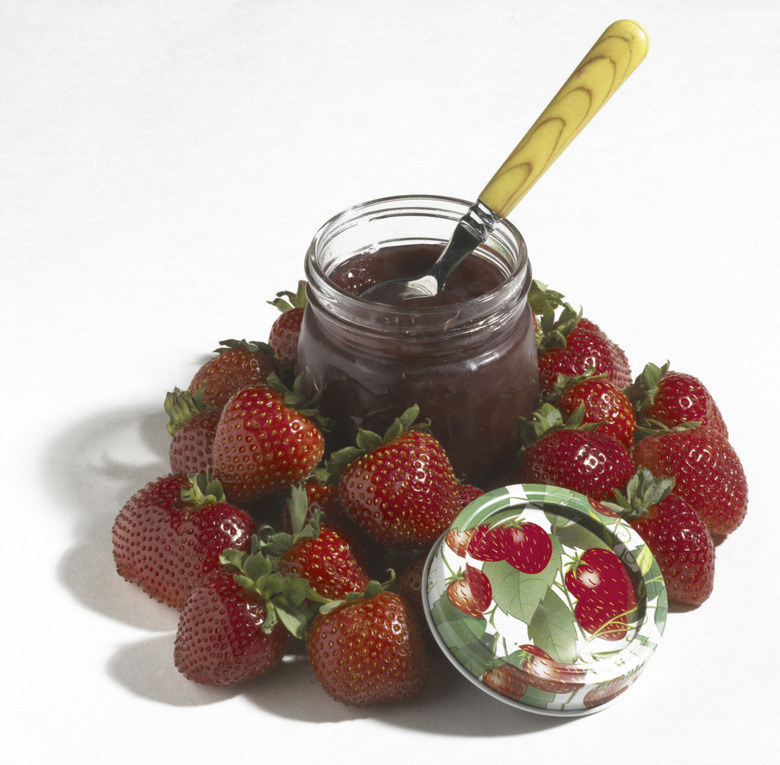Is Sorbitol Safe For Dogs? The Effects Of Sorbitol Chewing Gum On Dogs
A sugar alcohol, sorbitol occurs naturally in a variety of fruits. Commercially, manufacturers use it as a sugar substitute in chewing gums and other products, although doctors often prescribe it as a laxative. While you should avoid feeding your dog appreciable quantities of the compound, as it may upset her stomach, sorbitol is not highly toxic to dogs. In fact, many canine tooth pastes contain small quantities of the substance. Nevertheless, contact your veterinarian if your dog consumes a significant quantity of a sorbitol-containing product.
Simplifying Sorbitol
Simplifying Sorbitol
Found in a range of low-calorie foods, the sorbitol molecule broadly resembles that of sucrose, save for a few important differences. The human body initially reacts to sorbitol as though it were sucrose — which is why it tastes sweet, notes chemist, professor and author Eric Walters of the website www.TheSweetenerBook.com. Once it is time to absorb the calories, the body finds it cannot properly process the sorbitol, so it gets rid of it. Aside from loose stools, bloating and gas, humans — as well as dogs — tolerate the substance rather well.
Dangerous Alternatives
Dangerous Alternatives
Dog owners may fear sorbitol because it sounds similar to xylitol. Like sorbitol, xylitol is a sugar substitute; unlike sorbitol, xylitol is incredibly toxic to dogs. In humans, xylitol works similarly to sorbitol, but a dog's body does not distinguish between xylitol and sucrose. This means that dogs who ingest even a small amount of xylitol may suffer from dangerously low blood sugar levels, brought on by the overproduction of insulin. Take your dog in for immediate veterinary attention if he ingests xylitol-containing products.
Sorbitol Side Effects
Sorbitol Side Effects
Although sorbitol is essentially safe and unlikely to cause your pet significant illness, it may cause minor to moderate stomach upset. While these symptoms typically subside quickly and without treatment, contact your veterinarian if they persist for more than 24 hours. Because sorbitol accelerates the passage of waste, many activated charcoal mixtures — medicines designed to absorb ingested toxins — contain sorbitol.
Products Containing Sorbitol
Products Containing Sorbitol
In addition to naturally occurring sources found in plums, apples and pears, sorbitol is a component of certain sugar-free baked goods, sugar-free gums and beers, as well as a surprising number of human medications, including many cough syrups and laxatives. A 1993 review, published in the Annals of Pharmacotherapy, found that 42 percent of the liquid medications at a single hospital pharmacy contained sorbitol. Additionally, some products use several different sugar substitutes — potentially including sorbitol, xylitol or both — and list them generally, as "sugar alcohols."
Always check with your veterinarian before changing your pet's diet, medication, or physical activity routines. This information is not a substitute for a vet's opinion.
References
- American Society for the Prevention of Cruelty to Animals: Sorbitol
- Annals of Pharmacotherapy: Sorbitol Content of Selected Liquids
- The Sweetener Book: Sorbitol
- Vet Street: ToxiBan® Suspension with Sorbitol
- Pet Poison Hotline: Xylitol – It's Not Just in Gum Anymore
- Food Intolerance Diagnostics: Food tables: Sorbitol and Xylitol
- AskAVetQuestion.com: Are These Foods Toxic to Dogs?
